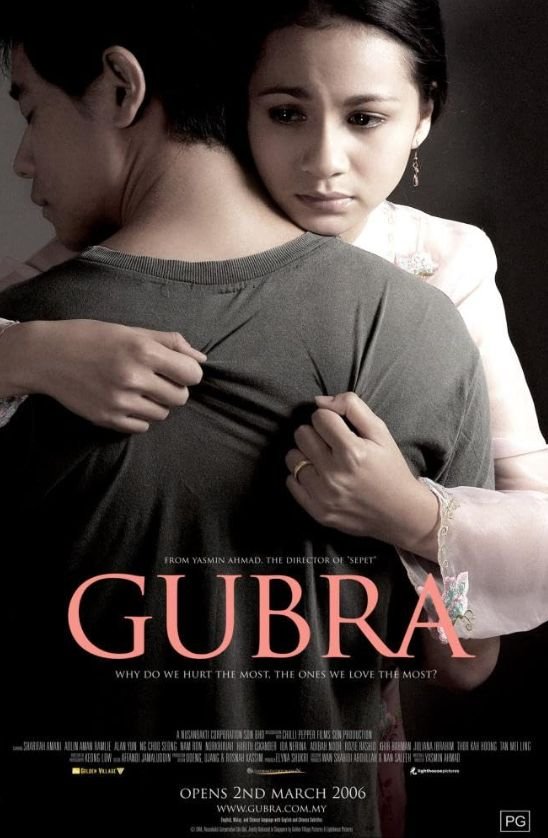NOOB FILM REVIEW - GUBRA (2005) directed by YASMIN AHMAD

- Best Asian Film 18th International Tokyo Film Festival 2005.
- Grand Prix Du Jury 27e du Festival International de Films de Femmes de Creteil 2005
Bismillahirahmannirahim.
It seems like I am watching Yasmin Ahmad's film in reverse order. My first one was Talentime (2009), where I learned that the main female cast (named Orked) was supposed to be Sharifah Armani and I did not know why.
Then I saw the film Mukhsin (2006) and wondered why Sharifah Armani is there with a Chinese guy, bearing the same name (Orked) as the main female character (Sharifah Aryana, Sharifah Armani younger sister).
Yesterday I saw Gubra (2005) and started to understand. At the beginning of the film, there is a scene where Jason is shown lying bleeding on the ground. Instantly I recall the poster of the film Sepet (2005) and Jason is on it (which I have not watched). And Sharifah Armani plays Orked but is married to a different guy.
So from here, I am deducing that the film Sepet, Gubra, and Mukhsin is sort of like a trilogy about Orked and his relationship with and post-Jason. Adding to the 'trilogy' is also the film Talentime (2009) where, as I have said earlier, Sharifah Armani was supposed to be in it with the actor Syafie Naswip but that did not happen.
Thus in my nonsensical mind, that might have been why, in the film Melur vs Rajawali, the chemistry between Syafie Naswip and Sharifah Armani seems to happen almost instantaneously, as if they have known each other for some time. Plus her first appearance was shown by director Al Jafree Md Yusop as being 'angelical.'
And I have not even started talking about Gubra. At some point, I think, according to Pak Hassan Muthalib, he lent his whole Tora-San series collection to Yasmin Ahmad, which has taught her how to tell a story. And watching Gubra is also upon the recommendation of Pak Hassan Muthalib.
And after only two Yasmin Ahmad films (Mukhsin and Talentime), Gubra is right away recognizable as hers. The tale of Orked relationship is to me a cover for a bigger story being told. Like how Tora-San might have taken the viewer to know how Japan is. It is the story of multiple races with different religious backgrounds living together in a melting pot called Malaysia. As in Mukhsin and Talentime, her cinematic poetry in relaying the subtext is quite visible to have started here in Gubra (though I haven't seen Sepet yet).
One example is how seamless the transition between scenes is. An old couple made peace on a hospital bed, a song connects it to the next scene of water spraying smoothly cleaning an old car. At the film's end, the Subuh call for prayers is interlinked with the scenes of Buddhists and Christians praying. Also, the subtleness of Nam Ron's character in dealing with the wrongs.
I said many years ago that, "God created us differently for us to know each other. What will we discover when we finally know each other? That we are all the same."
At the end of Gubra, Yasmin Ahmad attached a quote from Rumi that says (in my opinion) almost the same thing, which is "The lamps are different, but the light is the same."
The inclusion of the classic Hindustan song "Kabhi Kabhie Mere Dil Mein" also means "Sometimes, in my heart, a feeling emerges That you've been created just for me". To me in all Yasmin Ahmad films I have seen so far, it might just be about Orked's journey and her fate.